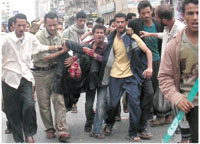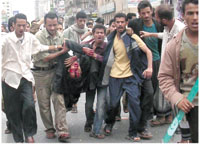
After riots left tens killed, dozens woundedYemeni cities on high alert [Archives:2005/862/Front Page]
July 25 2005
 |
SANA'A- At least 36 people were reported killed and 500 injured in the riots which were accompanied by chaotic acts and violence on July 19-20 in the capital city of Sana'a and other provincial capitals including Aden, Hodeida, Ibb, Sa'ada, Dhamar, Amran, Dhale' and Marib. The violent demonstrations pulled people together into the streets in protest against a government's decision to lift fuel subsidies.
Fierce battles took place on Thursday afternoon between citizens and republican guard forces near the Arhab Faculty of Education, to the north of the capital.
Eyewitnesses told the Yemen Times that one military vehicle was seen on fire and another broken down near the Arhab Faculty of Education. Three citizens and a number of government troops were also reportedly killed in the battles.
Numerous citizens used arms in confronting the military troops, who were backed up by a helicopter that fired upon citizens from the air. The helicopter was however forced to land when citizens returned fire.
Well-informed sources say that fierce clashes took place in the northern city of Sa'ada when several locals attempted to raid the police department, leaving a number of fatalities on both sides.
Other bloody confrontations happened between locals and military troops in Marib leaving a number of citizens and troops killed and wounded.
A source in Marib mentioned that locals are still blocking the highway to Sana'a and preventing oil and gas trucks from leaving or entering their city, which supplies large quantities of gas and other oil products. Also, Tribesmen from Nihm, east of Sana'a, blocked the highway running through their area and stopped all oil trucks owned by the government.
These two acts led to an unprecedented gas crisis in the capital, pushing the price of gas up to YR1200 per cylinder.
The Ministry of Interior issued a statement Saturday July 23rd describing demonstrations witnessed in the capital and other major cities as acts of vandalism and violence, particularly as they led to the killing and wounding of several innocent citizens trying to protect their shops and companies.
Additionally, the Ministry of Interior reported that around 255 security and military troops received different injuries and described those responsible for the chaos and those who opened fire on government troops as malicious actions intending to shake national security.
Since Wednesday, army tanks have occupied the streets of Sana'a and other major cities and the security authorities have been in sate of alert that violence may occur once again. After the riots had started government troops were deployed and dispersed the gatherings of citizens who were demonstrating against the government decision to lift the entire subsidy on fuel, which caused an unimaginable price hike.
Informed sources announced that some people attacked the Raida police department, burning a police vehicle and securing the release of some prisoners who have been detained for a long time at the department. The security forces launched detention campaigns and arrested a number of protestors.
Political parties and organizations announced their condemnation of such reforms and accused the government and the ruling party of killing innocent citizens. They condemned the acts of vandalism, violence and the smashing of government and private institutions and called citizens to use civilized means for expressing themselves.
No unified statement has been issued by the Joint Opposition Meeting Parties who condemned the violence accompanying the riots and urged the state to maintain security and stability. These parties attributed violence and the acts of vandalism to the thoughless policies pursued by the government.
Some opposition parties claim that elements from different government parties joined in the riots with a view to stirring up any peaceful demonstrations and provoking violence.
Islah, the biggest opposition party, condemned any violation of the constitution and the law during the expression of opinion and said that maintaining security and stability of the nation is the responsibility of the State. Mohammad Qahtan, Head of the Political Unit at the Islah Party maintained however, that the killing of protestors by the security forces is unjustifiable.
Political analysts noted that thousands of citizens were shocked by the sharp rise in fuel prices and this is why they streamed onto the streets venting their frustration, but trouble makers infiltrated the crowds and incited violence. Peaceful protesters were unsure how to express themselves, and were caught in the middle of these violent confrontations. The majority of the protestors who took to the streets did so in the expectation that government forces would only arrest the trouble makers, and did anticipate the violent clashes that took place.
The Opposition Meeting Parties failed to play an effective role in organizing and leading the angry protestors. While the security authorities were not well enough prepared to maintain security and prevent marchers from smashing government offices. This lack of foresight led to the clashes between the authorities and armed civilians.
However, the heavy rains which fell on the capital city of Sana'a and other main cities on Wednesday afternoon helped disperse the crowds and limit the chaos and battles between rioters and the government troops.
Troops from the republican guard, the first armed division and the central police backed by tanks and armed vehicles dispersed crowds and gatherings in streets. On the Wednesday afternoon, cars vacated the streets and citizens eventually returned to their shops and houses. Life and business came gradually back to normal with complete calm restored on Friday.
Citizens have begun to attack opposition parties who played no role in the organization of marches or stopping the economic reforms. They accused them of acting as an accomplice with the government in exchange for raising their financial allotments and benefits.
Opposition parties maintain that had they shown a firm stand and supported the riots, this would have caused confrontations with government troops and a political crisis difficult to resolve.
——
[archive-e:862-v:13-y:2005-d:2005-07-25-p:front]


